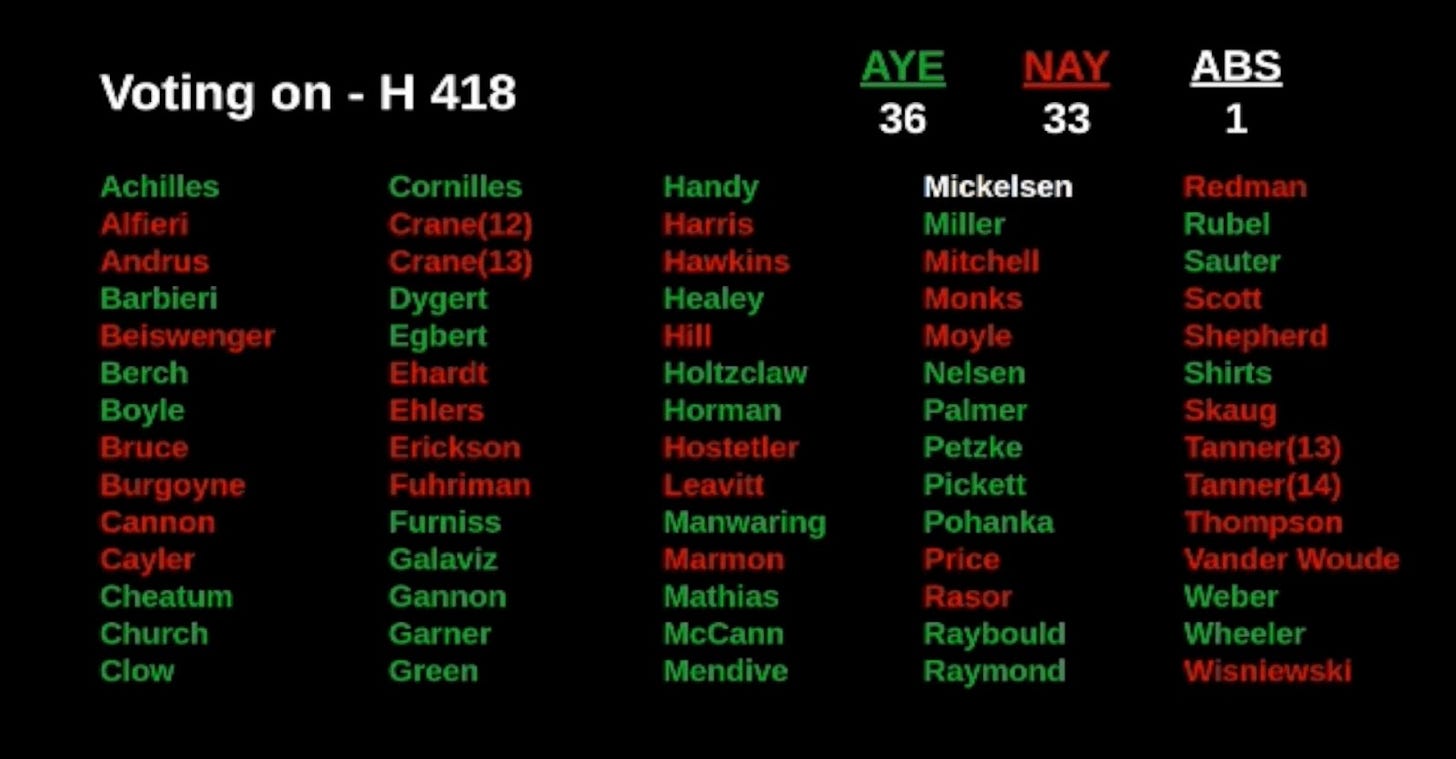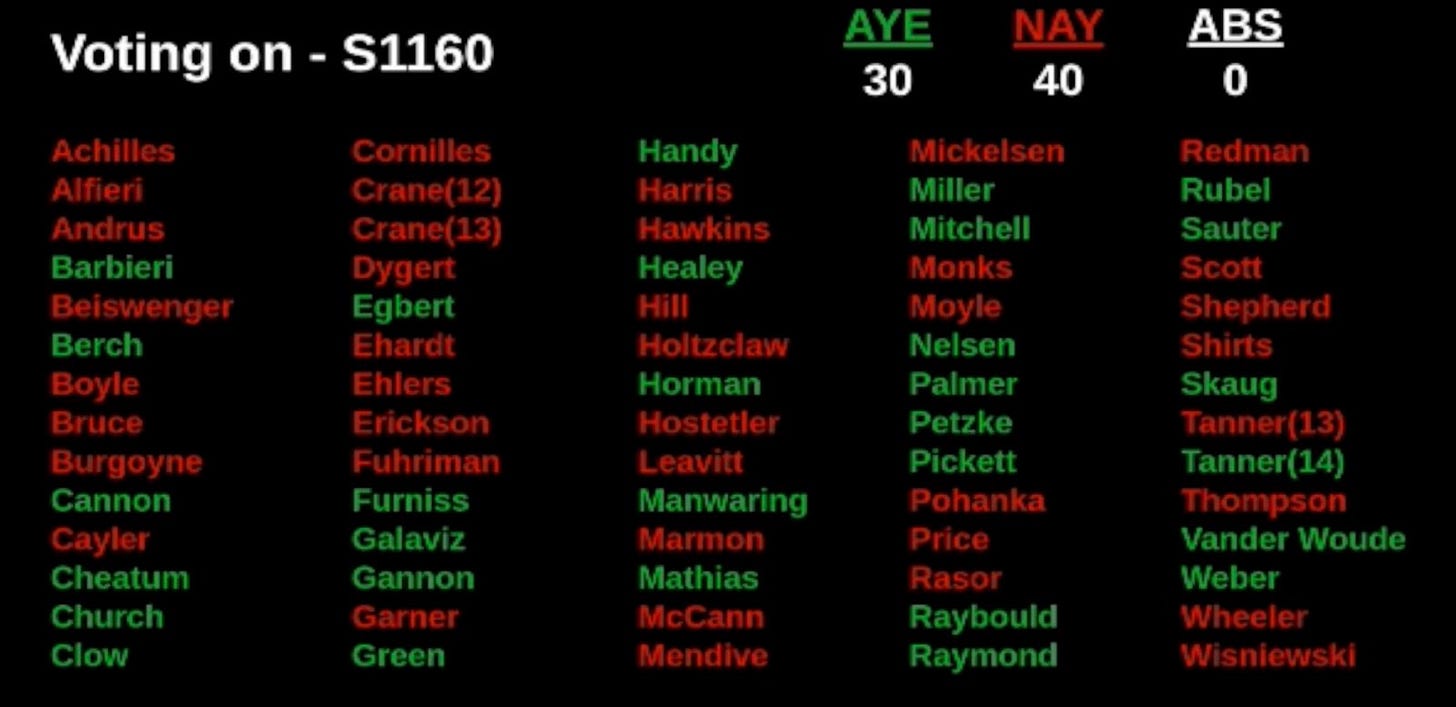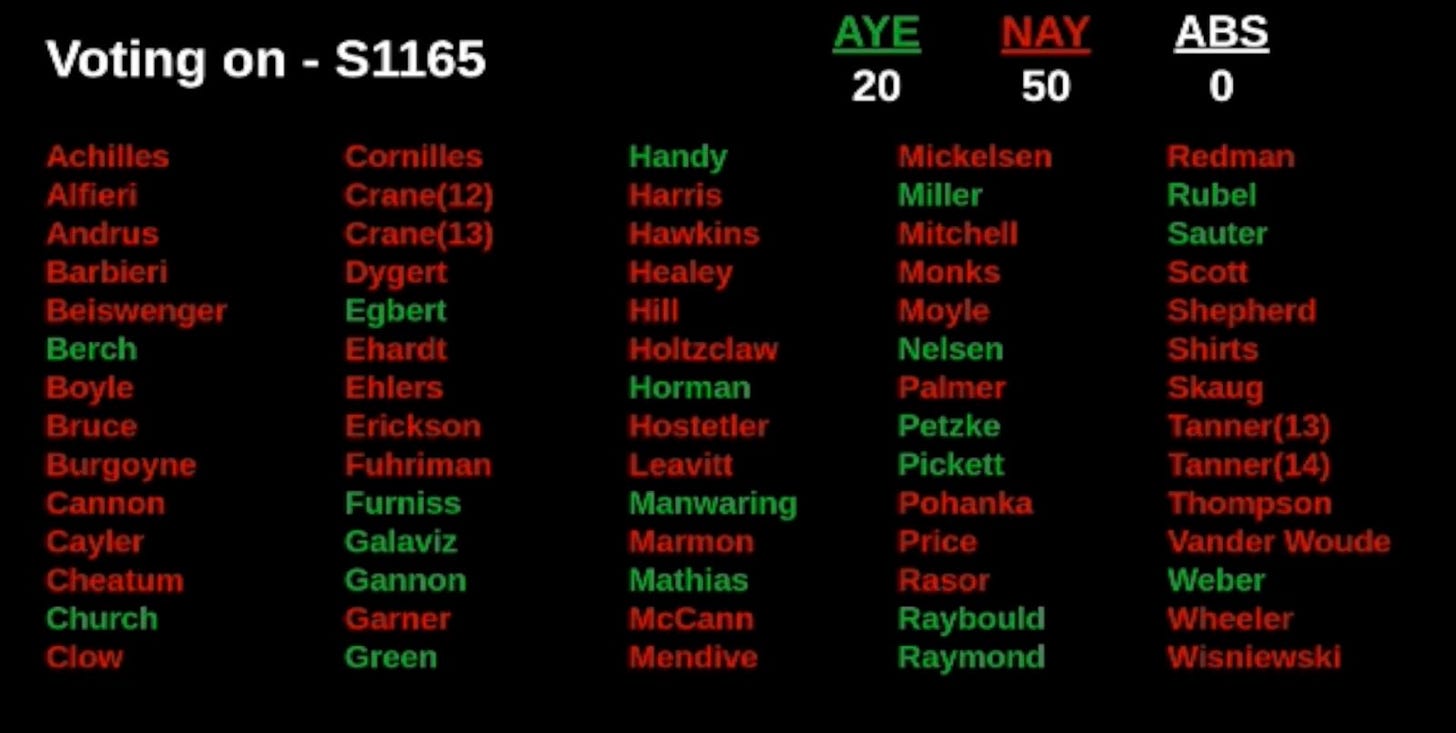The Budget Pledge: Holding the Line
We’re heading into the final week of the session, and budget votes are coming fast. We’ve seen more 'NO' votes than ever before, thanks to a more conservative legislature that’s finally willing to push back. With a projected end date of March 28, there’s growing pressure to pass these budgets quickly, but speed shouldn’t override stewardship.
All but two of the essential maintenance budgets have passed. These are the budgets that keep the lights on and the doors open. They include state-approved pay raises and ensure essential services stay in place. We committed to supporting them, and we’ve kept that commitment.
But the rest? That’s the wish list.
When we signed the Budget Pledge, we committed to a few simple principles:
Fully fund maintenance budgets
Hire no new employees
Cap budget growth at 1.2%
Stop taking federal money with strings attached
Those aren’t just talking points. They are a roadmap for real fiscal discipline in a state where the budget has grown 55% in just five years.
We don’t have to pass every budget just because it made it out of committee. If we’re serious about DOGE, it starts with saying NO to runaway spending and YES to sustainable, accountable government.
The Idaho Way shouldn’t look like Washington, D.C.
A Word About Maintenance Budgets
We committed to voting YES on all maintenance budgets, and we’ve honored that. These budgets keep Idaho’s government running: lights on, doors open, and paychecks issued.
But there was one exception.
The Health and Human Services budget, S1108, was a staggering $5.3 billion—41% of the entire $12.8 billion maintenance package. That’s simply too large to ignore.
While we remain committed to fully funding essential services, this budget was excessive in size and scope, especially given the lack of meaningful reform or accountability in Health and Welfare spending.
We all voted NO, but the bill still passed 30-4-1 in the Senate and 63-7-0 in the House.
Budgets We Voted No On, And Why
H418 – Division of Career and Technical Education
We support Career and Technical Education, but this budget wasn’t just about maintaining programs. H418 included an enhancement of $12.3 million on top of an already large base, bringing the total appropriation to nearly $110 million for FY26. That’s a 12.6% increase over the maintenance budget, and the base itself has grown 36.8% in just three years.
That kind of growth is unsustainable.
This proposal added another $10 million to CTE programs at the governor’s request, with no real evaluation of what previous spending has achieved. We’ve seen year-over-year increases in workforce development dollars with little accountability. Before pouring more money into these programs, we must know they deliver results for students and employers.
We don’t oppose CTE; we oppose unchecked spending. This budget failed the fiscal responsibility test, so we voted no. It has not yet been heard in the Senate.
S1138 – Department of Finance
This budget was a clear example of government expansion we can’t afford. S1138 included an enhancement of $765,800 and added 5 new full-time positions, bringing the total appropriation to nearly $12 million and staffing to 77 full-time positions.
That’s a 6.8% increase over the maintenance budget, and the base budget has already grown 31.8% in just three years.
We’re not opposed to regulatory functions, but we are opposed to growing government without a clear, demonstrated need. We took the Budget Pledge to stop unnecessary expansion and hold the line on spending. This budget didn’t meet that standard, and we voted no.
It passed the Senate 22-13-0 but failed in the House 29-37-4. This was a major win for fiscal conservatives.
S1154 – Commission on the Arts
This bill raises deeper questions about the proper role of government.
The base budget grew 11.8% in the last three years, and 54% of this agency’s funding comes from federal dollars. That raises red flags, but even more concerning is the agency’s stated purpose to: “encourage artistic expression and public interest in the arts.”
That is not the job of government.
Art is a protected form of speech under the First Amendment, and it thrives best in the private sphere, where individuals, communities, and the free market decide what is worth supporting, not the state.
Government should not be in the business of picking winners and losers in the arts. We pledged to oppose this kind of agency, and we did.
It narrowly passed the Senate 18-16-1 and has not been heard yet in the House.
S1160 – Health and Welfare: Other Programs
At $78 million, this was no small budget. S1160 included an enhancement of $2.6 million for FY2026, a 6.7% increase over the maintenance budget despite no new full-time positions.
More concerning, the Licensing and Certification Division has grown 16.7% in just three years. That kind of rapid growth demands correction, not further funding.
This budget also leans heavily on federal money:
Indirect Support Services: 51.8% federally funded
Independent Councils: 76.2% federally funded
Licensing and Certification: 61.8% federally funded
When more than half your funding comes from Washington, you’re no longer making Idaho decisions. You’re executing federal priorities.
We voted no because this budget continues Idaho’s federal dependency and unsustainable growth.
It passed the Senate 24-11-0 but failed in the House 30-40-0, another win for fiscal conservatives.
S1165 – Department of Health and Welfare: Behavioral Health
S1165 requested a $261,400 enhancement, bringing the total budget to over $146 million for FY2026 and funding 757 full-time positions.
After the agency overspent federal grant money, the budget included a troubling fund shift in the Substance Abuse Treatment and Prevention division. SAMHSA placed it on a remediation plan, and rather than right-sizing operations, the agency simply shuffled funds to hide the overreach.
The reliance on federal money here is extreme:
Mental Health Services: 24% federally funded
Psychiatric Hospitalization: 12.1% federally funded
Substance Abuse Treatment and Prevention: 88.5% federally funded
On top of this, the agency requested a $6.7 million supplemental for FY2025 and more funding for FY2026.
If even the federal government is raising concerns about how an Idaho agency spends its money, we should take that seriously.
We voted no.
The bill passed the Senate 22-12-1 but failed in the House 20-50-0, another victory for fiscal conservatives.
We’re Just Getting Started
Several more budget bills need to be voted on, and we’ve upheld our pledge every step of the way.
We’ll continue to stand for limited, responsible government. That means funding what’s necessary, rejecting what’s wasteful, and never losing sight of who we work for: the people of Idaho.
More votes are coming. Expect us to keep holding the line.
More From the Gang of Eight
While holding the line on budgets, we’ve also been fighting on other critical fronts to defend liberty and push back against government overreach. Here’s what some of the Gang of Eight have been up to:
Senator Glenneda Zuiderveld breaks down two troubling bills—S1183 and H303—backed by Idaho Power and Bayer. She explains how both proposals would shield these corporations from accountability while putting Idahoans at risk. Read why she’s voting no and standing up for the people, not the powerful.
Senator Josh Kohl is raising serious concerns about H78aa, the bill to create digital driver’s licenses in Idaho. He explains how this “convenience” could lay the groundwork for digital surveillance and government overreach. Read why he voted no and how the bill died in committee thanks to strong opposition.
Representative Lucas Cayler recently joined the Nate Shelman Show to expose this session’s wave of police state expansion bills. He breaks down the growing threats to individual liberty, from surveillance to unchecked authority. Listen to his interview here.
For more updates on what’s happening at the Capitol, follow the rest of the Gang of Eight on Facebook. They’re sharing what the media won’t and keeping you informed in real time.
We came to the Capitol with a promise to serve the people, not the system. That means fighting bloated budgets, resisting corporate influence, defending individual liberty, and telling the truth, no matter the pressure.
We’re not backing down. Not now. Not ever.
If you support what we’re doing, share this update, talk to your neighbors, and stay engaged. Your voice gives us the strength to keep fighting—for Idaho and for future generations.
In Liberty,
Senator Christy Zito, District 8
CZito@senate.idaho.gov
Senator Glenneda Zuiderveld, District 24
GZuiderveld@senate.idaho.gov
Substack: @glenneda
Senator Josh Kohl, District 25
JKohl@senate.idaho.gov
Substack: @joshkohl4idaho
Representative Faye Thompson, District 8
FThompson@house.idaho.gov
Representative Lucas Cayler, District 11
LCayler@house.idaho.gov
Substack: @lucascayler
Representative Kent Marmon, District 11
KMarmon@house.idaho.gov
Substack: @kentmarmon
Representative Clint Hostetler, District 24
CHostetler@house.idaho.gov
Substack: @theidahoresolve
Representative David Leavitt, District 25
DLeavitt@house.idaho.gov
Substack: @leavitt4idaho
Paid subscribers to this Substack will be recorded on Zito For Idaho’s sunshine report as a contribution to a political candidate. Subscribers don't have special access or content. I appreciate your support.














We shared your substack article here: https://tinyurl.com/2s4zxksb
Thanks so much for writing this!
Thank you for this report and thank you to all the gang of eight for supporting good and opposing bad bills.
Totally agree with Sen. Kohl on H0078; we wrote about it here: https://substack.com/profile/68304299-big-e/note/c-90063381
Question about passing maintenance budgets as a matter of policy. Is it correct that next year's "maintenance" budget will include everything passed this year -- maintenance budget + enhancement budget -- year after year? If this assumption is correct, government will keep on growing far beyond the need to keep the lights on.
If we were really serious about DOGE, we would first carefully define "proper role of government," a fuzzy term that seems to mean different things to different people. Then:
1. Dissolve all departments and functions within those remaining that do not fit within proper role of government.
2. Cut maintenance budgets to the bone for all departments that remain, keeping only those functions absolutely necessary.
3. Approve expansion budgets only to the extent they are needed to handle inflation or to fund NECESSARY proper-role-of-government functions required by legislature.
4. Take NO federal money to keep Idaho afloat.
5. Stop passing bills that increase staffing and spending. Repeal those already passed.
The gang of eight has done a good job of holding the line as best they can. But they need to convince voters and other legislators that fiscal responsibility is a virtue, not a curse.
Voters must wake up too. They demand too many unnecessary services from government. They've become far too complacent, assuming an "R" after a candidate's name will do the job. As the voting boards you showed prove, plenty of "Rs" are big spenders who make the Idaho Association of Commerce & Industry (IACI) organization happy, while leaving everyday citizens behind.
NOTE: To find out a legislator's IACI score, start here: https://scorecard.iaci.org/#/ . If you like spending and corporatism, you'll like the highly rated legislators. If you don't like such things, you can interpolate the "conservative" score by subtracting the IACI score from 100.
You can sort the IACI list in various ways and see what bills contributed to their scores by clicking a legislator's Voting Record link (each bill listing shows IACI's Support, Oppose, or Neutral ranking for the bill).
Some examples -- names, party, IACI score, interpolated "conservative' score -- from the alphabetical list on IACI's scoreboard:
Todd Achilles (D) = IACI 89 | "conservative" 100-89 = 11
Ben Adams (R) = IACI 92 | "conservative" 100-92 = 8
Joe Alfieri (D) = IACI 44 | "conservative" 100-44 = 56
Steve Berch (D) = IACI 72 | "conservative" 100-72 = 28
Treg Bernt (R) = IACI 100 | "conservative" 100-100 = 0